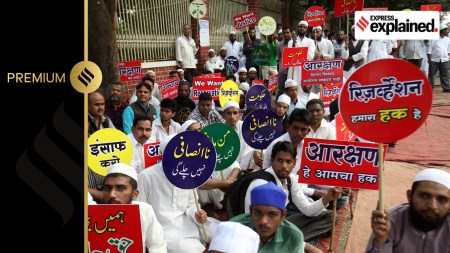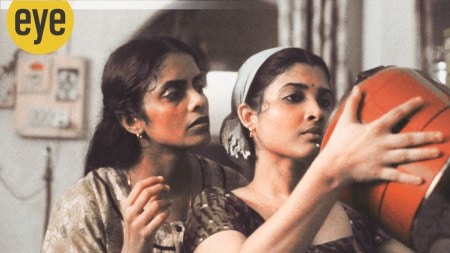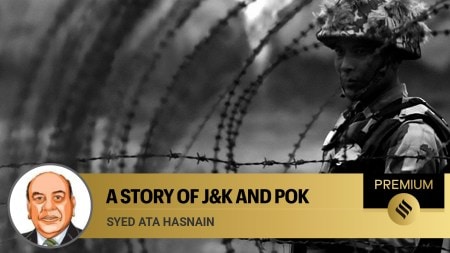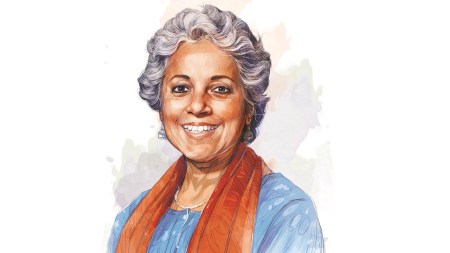Half an hour to midnight, the wail of the engine slices through the humid air of Ernakulam Junction. What follows is a scramble to slide and squeeze supple bodies and their luggage through the crowded doorway.
A policeman on the platform curses and wields his lathi that lands on the steel rod of a window, an overzealous vendor is still pitching his sales, sprinting like a relay runner even after the entirely unreserved train has taken off.
The Ernakulam Junction-Howrah Junction Antyodaya Express brakes with a heavy grunt, as if it has forgotten something or someone, before it lumbers along its tedious 2,238-kilometre cross-country run.
The platform, where multitudes had assembled, is now deserted. There is no one to see them off, to wave a goodbye or stifle a tear. The train has swallowed the multitudes – the nameless, faceless men who are part of Kerala’s 34-lakh interstate workforce and who are now on a journey back home for a price of Rs 575.
 Passengers stop for a meal (Express photo by Sandip G)
Passengers stop for a meal (Express photo by Sandip G)
It’s a journey back to the familiar — to the pungent fragrance of smoking mustard oil to children climbing on to their shoulders and long evenings with brothers and uncles on endless cups of lebu cha (lemon tea).

But this time, as they fill every inch of the train’s general compartment, they do so with an added purpose. Almost all of them are men in the coach headed home to vote — to West Bengal, Odisha and Assam, states that are in different stages of elections for the Lok Sabha.
‘You will end up standing till Howrah’
Among the passengers is Moosa Haq, 29, wiry and smile-ready, who works as a butcher in a meat stall in Mala, a small town an hour from Kochi, who is now headed to his village near Ranaghat in Nadia district.
“Even when we leave our villages, no one comes to see us off. So why should anyone care for us here? I have friends, but they have their own things to do,” he says, tucking his bag onto the wooden overhead rack. In the bag, he says, are saris for his wife, toys for his daughters and some sweet murukku for his mother.
He blankly scans the faces of strangers in the coach, one of the 16 compartments in the fully unreserved train. Most of them are like him, migrant labourers, or as they are called here, guest workers. Some sit upright on their seats, the skin of the cushion peeled, baring the spongy foam; others lie on the floor; a few have climbed into the luggage rack, their heads bent, brushing the ceiling. Many are standing, constantly on the lookout for a space to sit or even stand comfortably.
Moosa sympathises with them: “If you don’t get a seat here, you will end up standing till Howrah.” Then with a triumphant grin, he adds: “Aaj kismet mere saath tha (Luck was on my side today). I got a side seat, near the window.”
 “Even when we leave our villages, no one comes to see us off. So why should anyone care for us here (in Kerala) ? I have friends but they have their own things to do,” Moosa Haq, a resident of Nadia district. (Express photo)
“Even when we leave our villages, no one comes to see us off. So why should anyone care for us here (in Kerala) ? I have friends but they have their own things to do,” Moosa Haq, a resident of Nadia district. (Express photo)
The advantages are many — he doesn’t need to share his seat with anyone, he can feel the breeze on his face, even if it’s skin-burning hot, and can occasionally light up a beedi, which, he says, is his only indulgence.
“We spend all our life trying to make things easier for our family, we see them just once a year. So we need some entertainment in life,” he says justifying his addiction.
It was seven years ago that Moosa travelled to Kerala for the first time. A friend had promised him work at a salon, but by the time they reached the place, the job was already taken. He ended up doing odd jobs before he got the butcher’s job. “Acha hain, sir. Mahine mein 10-15 hazaar kamathe hain (It’s good… I end up earning about Rs 15,000 a month),” he says.
He usually goes home once a year, during Ramadan, mostly late March or April. Instead, this year, he travelled in February for the birth of his second daughter, and this journey, he will club the polls and Bakrid (which falls in June).
Politics neither fascinates nor intrigues him. He does not know the name of the candidates contesting from his constituency, Ranaghat, which votes on May 13. For the record, the tussle is between incumbent Jagannath Sarkar of the BJP and TMC’s Mukut Mani Adhikari. Those names hardly strike any chord, though he admires the state Chief Minister and Trinamool leader Mamata Banerjee.
 There are only five trains from Ernakulam to Howrah every week. (Express photo)
There are only five trains from Ernakulam to Howrah every week. (Express photo)
“For a woman to become a CM takes a lot of courage. And she is doing good for the poor, I have heard from friends,” he says. But he largely stays away from politics. “I don’t even watch reels of politicians, unless there is some comedy. Waste of time,” he says.
But the local politicians are paying for his trip, besides giving him other “gifts” (money, a liquor bottle, biriyani). “Usually, they book tickets, but this time it did not happen. Don’t know why, maybe because there are too many people and a few trains, so they can’t book for all,” he says.
There are only five trains from Ernakulam to Howrah every week. Only two trains, one weekly and another that runs five times a week, connect Kerala to Assam.
Beyond the crammed aisle, sticking out his neck, Moosa’s friend Afsal Ismaili, who is from Asansol and works in a sawmill in Chalakudy in Kerala’s Thrissur district, shouts, “Who cares for us?”
Afsal is 45, battle-hardened and well-travelled — from “Ladakh to Kanyakumari”, he claims. As a youngster, he was attracted to politics, and would attend rallies of the CPI(M), before he realised it’s a futile endeavour.
“We are remembered only during elections,” he says, adding, “The local councillor’s secretary doesn’t even know me, but he has been calling almost twice a week on my phone to ensure that I reach there in time for the election. I told him, ‘ticket kar do, full bottle kar do’. He didn’t manage the ticket, but has promised full refund and Rs 100 extra, besides ‘full bottle’. I wouldn’t vote if they don’t pay the amount for the ticket,” he says, before quickly saying, “No, no I’m joking, I have never missed an election in my life.”
The star attraction in Asansol is yesteryear actor and TMC candidate Shatrugan Sinha. He has watched his movies, but says he loves the movies of his daughter Sonakshi more. Sinha is the sitting MP, but Afsal fears whether his opponent, BJP’s S S Ahluwalia, will topple him. “Sardarji acha aadmi hain, lekin galat party mein hain (Ahluwalia is a good man in the wrong party),” he says.
But for Afsal, all the discourse around elections isn’t pleasant. “I live in a Hindu majority area. We were all like brothers. Now some of them call us Bangladeshis. It’s true, our ancestors came from Chittagong (in Bangladesh), but so have most of them (Hindus). All this Hindu-Muslim talk, especially by the BJP, is destroying our brotherhood,” he says.
Which is why, Afsal says, he doesn’t invest too much into politics. For, soon after the polls they are forgotten too, much like the promises the politicians make. “Twenty years ago, we were promised two-room houses with concrete roofs. But we still live in asbestos-roofed rooms,” he says.
The roofs creak in monsoon, the heat becomes intolerable in the summer months, and the toilets are in terrible shape. He is saving money so that his children needn’t fear the monsoon or endure the summer’s wrath. He fled home when he was 15, driven out by his own father because the family was still expanding.
His only fear is if he would lose the job back in Kerala by the time he returns. But Moosa reassures him, “We survived the lockdown and COVID-19, so we will survive anything.”
‘Those who died on Coromandel were people like us’
As the train races past Coimbatore, Ansari rears his head from the adjacent seat and says, “Covid times were hard, but so is every day. So we try not to think of past struggles.”
In March last year, Ansari nearly boarded the Coromandel Express — a migrant train much like this one which was on its way from Shalimar in Howrah to Chennai. At the Bahanaga railway station in Odisha’s Balasore district, the Coromandel collided with a goods train and then ricocheted into a passenger train, killing nearly 300 people.
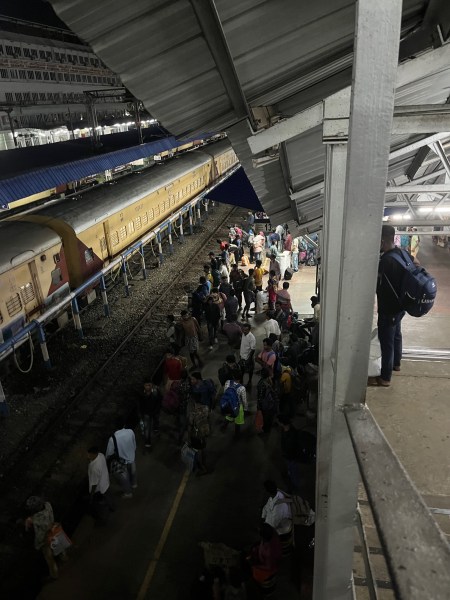 Only two trains, one weekly and another that runs five times a week, connect Kerala to Assam. (Express photo)
Only two trains, one weekly and another that runs five times a week, connect Kerala to Assam. (Express photo)
“Who were the people who died? Most in the reserved compartments were saved; only those in the general coaches, labourers like us, died. Come to my village, there are parents who believe that their missing sons from that accident will come back,” he says, his eyes seething with rage. That day, his plan was to buy a ticket from Murshidabad to Vijayawada and board another train to Thrissur, where he was working in a bakery. But the Coromandel was so crowded that he couldn’t get in.
The 33-year-old is from Naoda near Berhampore in Murshidabad, a long-time bastion of the Indian National Congress. He strikes a Kerala connect — the lotus has never bloomed in his constituency, he says. Though he is critical of the sitting MP, Adhir Ranjan Chowdhury of the Congress who had had an undefeated run since 1999, he would rather see him win instead of the BJP’s Nirmal Kumar Saha or Trinamool’s Yusuf Pathan, the former cricketer. His grandfather and father were all staunch supporters of the Revolutionary Socialist Party during the Tridib Chaudhuri years, he says.
“They were honest, hardworking and spent too much time in politics. That’s why we remain poor and I have to travel all the way to Kerala to support them,” he says. Then he implores: “Yeh baat chhod do, sir (forget all this).” He then flips his mobile phone — which he ties to the lungi, lest it be stolen — and plays a Bengali melody by Arijit Singh.
‘My home feels nearer’
Talks and songs fill the night, like the locomotive that blasts past a bridge over the limpid silver of the Bharathapuzha river and the inky ghats. “Pehli raat to aisa hi hain (The first night on the train is like this). We keep talking till the morning, watching each other settle down, seeing new people, meeting some others. It’s all about the joy of reaching home soon,” says Afsal.
The ceaseless rush of passengers makes their nights longer, before they twist and turn and slip subconsciously into slumber. Fatigue hits them when they wake up the next day, somewhere past Salem in Tamil Nadu, much after the first rays of sun had slithered in through the windows and the chai vendors had fully strained their vocal cords.
Dreariness displaces enthusiasm. It’s to do with the scenery, says Ansari, peering his drooping eyes along the endless stretch of wastelands past Salem. “It only gets worse once you enter Andhra (Pradesh). I cannot imagine the heat,” he says. Especially this May, when the heatwave has not spared any of the southern states. “40 (degree Celsius) in Kerala, 45 in Tamil Nadu, 50 in Andhra),” says Ansari.
Like most others in the coach, he is only in his lungi. He wonders whether he has to tear that away by the time the train reaches Kharagpur Junction.
Around 1 am, he unpacks a tightly knot polythene bag stuffed with rotis. In another plastic tumbler is the aloo bharta he has cooked. The train, he says, doesn’t have a pantry car and the vendors largely sell stale food.
“We are poor, so they can sell us week-old food. And you know how difficult it is to find your way (through the crowds) to the toilet, which invariably wouldn’t have water. So I don’t want to take any risks,” he says.
 The Ernakulam Junction-Howrah Junction Antyodaya Express brakes with a heavy grunt, as if it has forgotten something or someone, before it lumbers along its tedious 2,238-kilometre cross-country run.
The Ernakulam Junction-Howrah Junction Antyodaya Express brakes with a heavy grunt, as if it has forgotten something or someone, before it lumbers along its tedious 2,238-kilometre cross-country run.
Just then comes along a ticket checker, who they call “kaala jadugar” for their black coats and the knack of popping up from nowhere. Moosa shows his ticket, which the TTE carefully studies, before almost flinging it back at him.
“He was looking to see if it’s an old ticket,” Moosa says later. “Everyone is suspicious of us and, of course, rude,” he says. Perceptions have hardened since last month, when a TTE was pushed to the tracks from a moving train (Ernakulam-Patna Express) and eventually succumbed to his injuries.
A couple of years ago, a guest worker allegedly assaulted a TTE in the same Ernakulam-Howrah train. “We are scared to travel in these trains. There is no security for our lives,” says a TTE, speaking on condition of anonymity.
Ansari understands their paranoia, but says, “If you treat us with respect, we too will. At the end of the day, we are all trying to earn a livelihood.”
At 10 am, the train jerks and pauses at Katpadi Junction, the last stop in Tamil Nadu, before it slithers into Andhra Pradesh. The same sequence repeats — a human torrent lashing into the coach, policemen hurling expletives, and vendors trying to sell their products, and Moosa and friends staring into their journey.
“One fourth of the journey is over, my home feels nearer,” he says. The engine wails.


